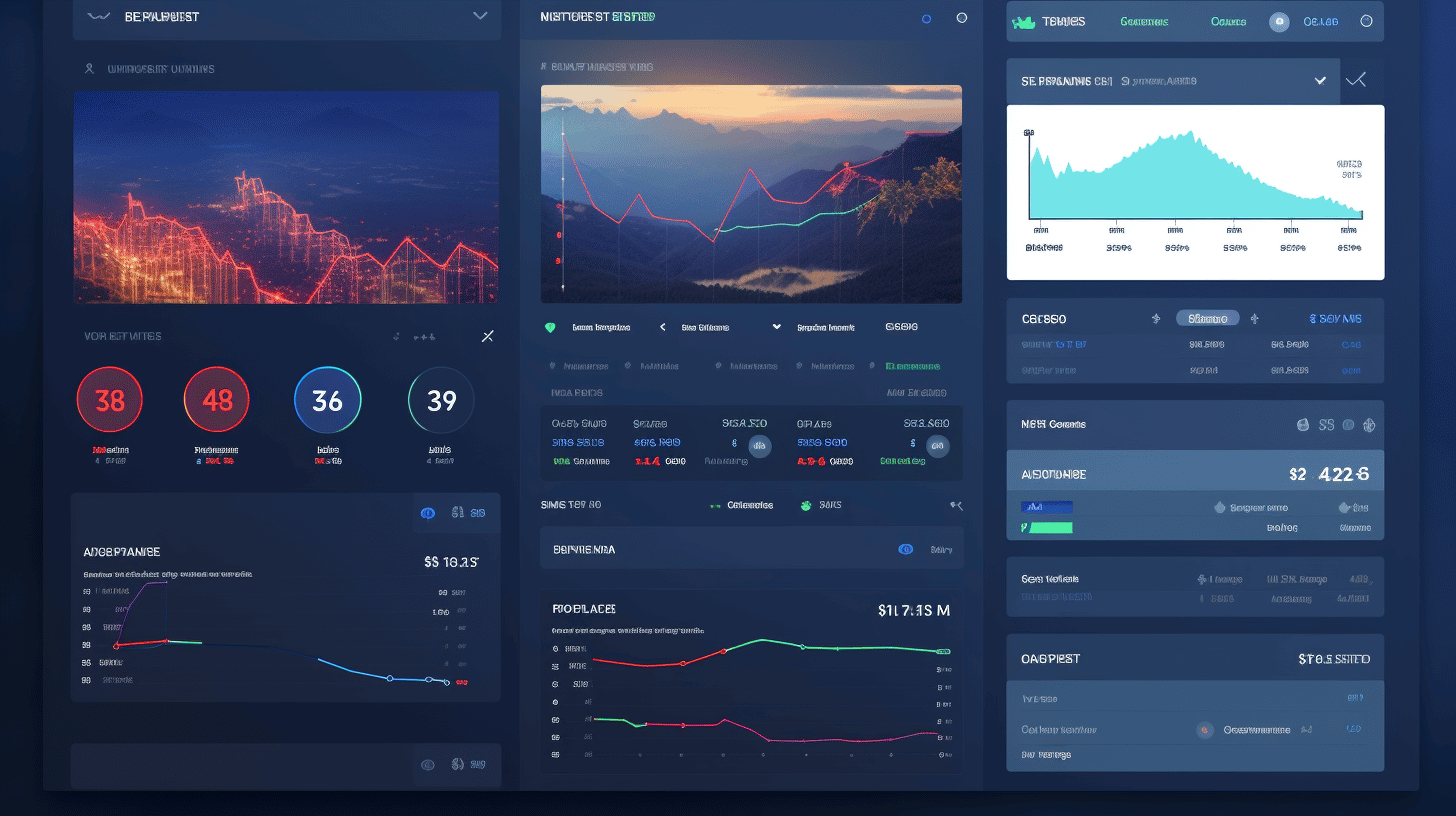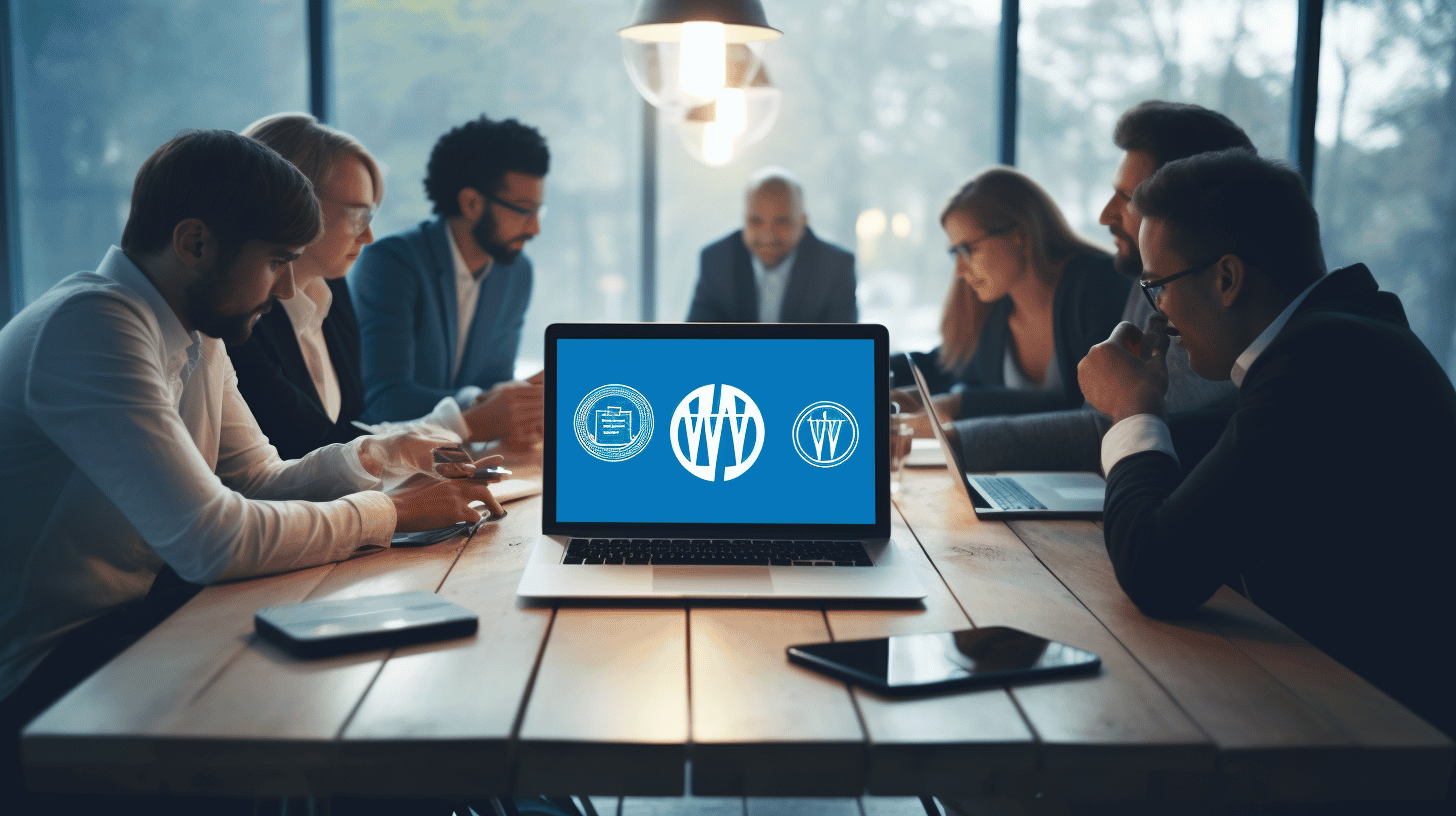在这个数字时代,拥有强大的在线形象对于企业和个人都至关重要。一个设计精良、功能齐全的网站可以帮助您吸引更广泛的受众、建立信誉并为您的品牌带来更多流量。在网站管理方面,WordPress 是许多人的首选平台。凭借其用户友好的界面和大量可自定义的功能,它已成为网站所有者的首选解决方案。
有效管理 WordPress 网站是最大程度扩大其覆盖面和影响力的关键。它涉及战略决策、技术知识和持续维护的结合。无论您是经验丰富的网站所有者还是刚刚起步,了解 WordPress 管理的核心方面都可以对您的在线业务的成功产生重大影响。
那么,有效的 WordPress 管理需要什么?在本文中,我们将探讨 WordPress 管理的重要性,并深入探讨各种可帮助您最大程度发挥网站潜力的策略和实践。从优化网站性能到实施安全措施和吸引受众,我们将涵盖所有内容。所以,让我们深入研究并揭开成功 WordPress 网站的秘密吧!🚀
了解 WordPress 管理
🔧 您是否熟悉 WordPress 管理及其在维护成功网站方面的重要性?如果不熟悉,请不要担心!在本文中,我们将深入研究 WordPress 管理的世界,并探讨其在保持网站顺利运行方面的重要性。🌟
WordPress 管理的重要性
在管理 WordPress 网站时,有几个关键方面需要考虑。让我们深入探讨一下为什么 WordPress 管理至关重要:
- 安全:WordPress 是一个广泛使用的平台,不幸的是,这也使其成为黑客的目标。定期更新 WordPress 安装、主题和插件对于维护安全的网站至关重要。💻
- 表现:加载缓慢的网站会赶走访问者并损害您网站的性能。有效的 WordPress 管理包括通过缓存、图像优化和压缩等技术优化您网站的速度和性能。⚡️
- 搜索引擎优化:搜索引擎优化 (SEO) 对于增加网站的自然流量至关重要。正确管理您的 WordPress 网站包括优化内容、改进网站结构和生成 XML 站点地图 - 所有这些都有助于提高搜索引擎排名。📈
- 备份和恢复:对您的网站进行可靠的备份非常重要,以防止紧急情况下数据丢失。通过有效的 WordPress 管理,您可以定期安排自动备份,并在出现问题时轻松恢复您的网站。💾
- 更新和维护:WordPress 定期发布更新以改进功能、安全性和性能。管理这些更新可确保您的网站受益于最新功能并与最新版本的 WordPress 保持兼容。🔄
WordPress 管理的核心方面
管理 WordPress 网站涉及影响其整体性能和功能的各个核心方面。以下是需要关注的一些关键领域:
- 主题和插件管理:定期更新主题和插件对于确保与最新版本的 WordPress 兼容至关重要。删除任何过时或未使用的主题和插件,以减少漏洞并提高网站性能。🔄
- 内容管理:持续创建和发布引人入胜的高质量内容是吸引和留住网站访问者的关键。实施有组织的内容策略、针对 SEO 优化内容以及定期更新现有内容对于有效的 WordPress 管理至关重要。📝
- 安全措施:实施强大的安全措施对于保护您的网站免受潜在威胁至关重要。考虑使用安全插件、启用 SSL 证书和实施强密码来增强网站安全性。🔒
- 监控和分析:跟踪网站的性能和用户行为对于做出明智的决策至关重要。利用 Google Analytics 等工具监控网站流量、用户参与度和其他重要指标,以不断提高网站的性能。📊
请记住,有效的 WordPress 管理是一个持续的过程,需要持续关注和采取主动措施。通过优先考虑安全性、优化性能并及时了解最新的 WordPress 更新,您可以确保您的网站成为您企业或个人品牌的宝贵资产。🚀
有关有效 WordPress 网站管理的更多提示,请查看 这一有用的资源.
现在您已经了解了为什么 WordPress 管理至关重要,让我们在下一部分中探索一些有效管理 WordPress 网站的实用技巧和最佳实践。📚
提高网站性能
您是否曾经访问过一个加载时间过长的网站?您可能很快就失去了兴趣,并转向了其他网站。在当今快节奏的数字世界中,网站性能在吸引和留住受众注意力方面起着至关重要的作用。加载缓慢的页面不仅会让用户感到沮丧,还会损害您的搜索引擎排名。在本节中,我们将探讨一些策略来改善您网站的性能并确保流畅的用户体验。
优化网站设计
精心设计的网站可以显著提高网页加载速度。以下是优化网站设计的一些技巧:
- 保持干净、整洁: 杂乱的网站,包含过多的图片和动画,会减慢加载时间。选择简洁、简约、注重基本要素的设计。
- 优化图片: 大型图像文件可能是导致加载速度变慢的主要原因。在不影响质量的情况下压缩和调整图像大小以减小文件大小。
- 选择响应式设计: 响应式设计可确保您的网站针对不同的设备和屏幕尺寸进行优化。这可缩短移动设备上的加载时间,考虑到移动用户数量的增加,这一点尤为重要。
SEO 的作用
搜索引擎优化 (SEO) 不只是提高您的网站在搜索引擎上的可见性。它还可以对您网站的性能产生积极影响。具体方法如下:
- 优化您的代码: 整洁且优化的 HTML、CSS 和 JavaScript 代码可以提高您网站的性能。缩小代码以删除不必要的空格、注释和换行符,从而减小文件大小并缩短加载时间。
- 使用适当的标题标签: 结构正确的标题标签(H1、H2 等)不仅可以帮助搜索引擎理解您的内容,还可以提高页面的整体可访问性和可读性。
- 确保快速、高效的抓取: 搜索引擎机器人会定期抓取您的网站以索引其内容。通过优化您的网站结构并确保快速加载时间,您可以帮助搜索引擎高效地抓取和索引您的网页。
移动优化的重要性
由于大多数互联网流量来自移动设备,因此优化您的网站以适应移动设备已不再是可有可无的。它对于用户体验和搜索引擎排名都至关重要。以下是移动优化如此重要的原因:
- 改善用户体验: 适合移动设备的网站可为移动用户提供无缝且愉悦的体验。它可确保您的页面快速加载,并在较小的屏幕上轻松导航,从而提高用户参与度和满意度。
- 移动优先索引: Google 现在采用移动优先索引,即优先为您的网站的移动版本编制索引和排名。如果您的网站不适合移动设备,则可能会在搜索结果中受到惩罚,从而影响您的自然流量。
速度优化
网站速度是用户满意度和搜索引擎优化的关键因素。以下是一些优化网站速度的策略:
- 启用缓存: 缓存可以临时存储网站数据,减少服务器负载并加快回访者的页面加载时间。
- 最小化 HTTP 请求: 网页发出的每个 HTTP 请求都需要时间来处理。通过将多个 CSS 和 JavaScript 文件合并为一个文件来减少请求数量。
- 优化服务器响应时间: 选择可靠的托管服务提供商并确保您的服务器响应时间尽可能快。
- 使用内容分发网络 (CDN): CDN 有助于将您的网站内容分发到世界各地的多个服务器上,从而减少延迟并缩短不同地区用户的加载时间。
结合这些策略不仅可以提高您网站的性能,还可以提高搜索引擎排名。通过保持网站整洁和优化、专注于移动优化并优先考虑速度,您将为用户提供无缝体验,让他们再次光临。
请记住随时了解 WordPress 的最新 SEO 实践。浏览 WordPress 搜索引擎优化 可以为您提供更多见解和技巧,以有效优化您的网站。
利用 WordPress 主题和插件
在创建美观且功能齐全的网站时,WordPress 是许多个人和企业的热门选择。它受欢迎的主要原因之一是拥有大量可用的主题和插件。这些工具允许您自定义网站并添加其他功能,而无需复杂的编码。
在本文中,我们将探讨利用 WordPress 主题和插件的好处以及它们如何增强您的网站。我们还将提供一些选择正确主题和确保插件和主题之间兼容性的技巧。
选择正确的主题
主题是网站设计和布局的基础。它决定了网站的整体外观和感觉,包括配色方案、排版和整体结构。选择正确的主题对于创建视觉上吸引人且用户友好的网站至关重要。
选择 WordPress 主题时需要记住以下一些提示:
- 考虑你的网站的目的:考虑一下您的网站的目标和目的。它是个人博客、电子商务商店还是作品集?每种类型的网站可能需要不同的主题来有效地展示其内容。
- 响应式设计:随着越来越多的人使用移动设备访问网站,选择适合移动设备且响应迅速的主题至关重要。响应式设计可确保您的网站在所有屏幕尺寸上都看起来很棒,从而提供无缝的用户体验。
- 自定义选项:寻找提供自定义选项以符合您的品牌标识的主题。轻松更改颜色、字体和布局的功能让您可以创建一个与众不同的网站。
插件的实用性
WordPress 插件就像是扩展网站功能的小附件。无论您是想添加联系表单、改善网站的 SEO 还是集成社交媒体共享按钮,几乎每个需求都有插件可供选择。
以下是一些可以增强您的网站的常见插件类型:
- SEO插件:使用 Yoast SEO 或 All in One SEO Pack 等插件提高网站在搜索引擎上的可见性。这些插件可帮助您优化网站的元标记、生成 XML 站点地图并提高整体搜索引擎排名。
- 安全插件:使用 Wordfence 或 Sucuri 等安全插件保护您的网站免受潜在威胁。这些插件提供恶意软件扫描、防火墙保护和登录安全等功能,以确保您的网站安全。
- 社交媒体插件:使用 Shareaholic 或 AddToAny 等插件提升您的在线形象并鼓励社交分享。这些插件会将社交媒体分享按钮添加到您的网站,让访问者可以轻松地在 Facebook、Twitter 和 LinkedIn 等平台上分享您的内容。
通过利用插件的强大功能,您可以扩展网站的功能并增强用户体验。
确保插件和主题兼容性
WordPress 生态系统中有成千上万个主题和插件,因此必须确保各种工具之间的兼容性,以防止可能出现的任何冲突或问题。
以下是确保插件和主题兼容性的一些最佳实践:
- 保持更新:保持主题和插件的更新,以确保与最新版本的 WordPress 兼容。开发人员经常发布更新来修复错误、添加新功能和提高安全性,因此及时了解这些更新至关重要。
- 阅读评论和评分:在安装主题或插件之前,请阅读评论并查看评级,以了解其兼容性和可靠性。寻找经常更新且用户反馈积极的主题和插件。
- 部署前测试:在将新主题和插件部署到实际网站上之前,最好先在临时环境中对其进行测试。这样,您就可以识别任何兼容性问题或与网站上现有元素的冲突,并在上线之前解决这些问题。
通过遵循这些提示,您可以确保在 WordPress 网站上无缝高效地集成主题和插件。
总之,利用 WordPress 主题和插件可以将您的网站从基本模板转变为完全自定义且功能丰富的在线展示。通过选择正确的主题、探索插件的实用性并确保它们之间的兼容性,您可以创建一个不仅能给访问者留下深刻印象而且还能满足您的特定目标和目的的网站。因此,深入 WordPress 主题和插件的世界,释放您网站的真正潜力吧!
🌐 WordPress 插件 🌐
WordPress 安全措施
在当今的数字环境中,网站安全至关重要。随着网络安全威胁的不断增加,实施有效的安全措施以保护您的 WordPress 网站免受潜在风险至关重要。忽视安全措施可能会导致数据泄露、敏感信息丢失以及在线声誉受损。
安全的重要性
确保 WordPress 网站的安全性至关重要,原因如下:
- 保护用户数据: 作为网站所有者,您有责任保护用户的个人信息。安全漏洞可能导致未经授权访问用户数据,从而导致身份盗用和其他恶意活动。
- 维护客户信任: 安全的网站能赢得访客和客户的信任。当用户确信自己的信息是安全的,他们就更有可能访问您的网站、进行购买并与他人分享他们的体验。
- 预防恶意软件感染: 恶意软件攻击会感染您的网站和用户的设备。这可能会导致用户体验受损、数据丢失和声誉受损。
- 避免网站停机: 网站被黑客入侵可能会导致严重的宕机,造成收入损失并对您的业务产生负面影响。通过实施安全措施,您可以最大限度地降低宕机风险并确保网站顺利运行。
实现安全插件
增强 WordPress 网站安全性的最有效方法之一是使用安全插件。这些插件可以增强您的网站对各种安全威胁的防御能力。一些流行的安全插件包括:
- Sucuri安全: 提供广泛的安全功能,包括恶意软件扫描、防火墙保护和黑名单监控。
- Wordfence: 提供实时威胁分析、恶意软件扫描和登录安全功能来保护您的 WordPress 网站。
- iThemes 安全性: 提供全面的安全功能,例如暴力破解保护、文件完整性检查和数据库备份。
这些插件通过阻止可疑 IP 地址、监控登录尝试和提供防火墙保护来帮助增强您的网站。请记住,虽然安全插件可以增强您网站的安全性,但它们应该与其他安全措施结合使用才能获得最佳保护。
定期更新和备份
WordPress 安全的另一个重要方面是及时了解最新的 WordPress 版本和插件更新。更新通常包含安全补丁,因此及时安装它们至关重要。定期更新有助于防止黑客可能利用漏洞未经授权访问您的网站。
除了更新之外,定期备份对于灾难恢复和网站安全也至关重要。备份 WordPress 网站可确保您在发生任何意外事件时拥有文件和数据库的副本。如果出现问题(例如安全漏洞或意外删除),您可以快速将网站恢复到以前的工作状态。
管理 WordPress 备份是网站安全的一个重要方面。您可以使用以下插件 管理 WordPress 备份 自动化备份过程并确保您的网站数据始终安全。
通过实施安全插件、保持最新更新并定期备份网站,您可以显著增强 WordPress 网站的安全性。采取这些措施将让您高枕无忧,保护您的网站和用户数据,并帮助您的在线业务蓬勃发展。🛡️💪
与观众互动
在当今的数字时代,与受众互动比以往任何时候都更加重要。与目标人群建立联系可以提高品牌忠诚度、客户满意度,并最终实现更好的业务成果。为了真正与受众互动,您需要采用有效的沟通策略、利用社交媒体平台并利用受众分析和指标来了解他们的偏好和行为。
有效的沟通策略
为了有效地与受众互动,采用能引起他们共鸣的沟通策略至关重要。以下是一些值得考虑的关键策略:
- 真实: 人们欣赏真诚,并希望与真实、真诚的品牌建立联系。通过分享故事、见解和经验,向受众展示您企业的人性化一面。这可以帮助您建立信任并与受众建立更牢固的联系。
- 聆听并回答: 沟通应该是双向的。花时间积极倾听受众的反馈、问题和顾虑。及时、周到地做出回应,表明您重视他们的意见并致力于满足他们的需求。
- 讲述引人入胜的故事: 讲故事是吸引观众的有力工具。精心编造能引起观众情感和体验共鸣的故事。无论是通过博客文章、视频还是社交媒体内容,故事都能吸引观众并留下持久的印象。
利用社交媒体
社交媒体平台彻底改变了企业与受众互动的方式。它们提供了直接的沟通渠道,让您可以实时与目标人群建立联系。以下是您可以利用社交媒体来增强受众参与度的方法:
- 选择正确的平台: 确定目标受众最常使用的社交媒体平台。通过了解他们在网上花费时间的地方,您可以将精力集中在这些平台上,并针对每个平台量身定制内容。
- 创建可共享的内容: 引人入胜的内容更有可能被分享,从而扩大您的影响力。尝试不同类型的内容,例如视频、信息图表和互动帖子,以激发兴趣并鼓励分享。
- 鼓励用户生成内容: 用户生成内容是吸引受众的有效方式。它使他们成为您品牌的积极参与者,并展示他们使用您的产品或服务的体验。鼓励您的受众分享他们的故事、评论和图片,并自豪地在您的社交媒体渠道上展示它们。
受众分析和指标
了解您的受众是有效吸引他们的关键。通过分析受众分析和指标,您可以获得有价值的见解,为您的参与策略提供参考。以下是您可以如何使用这些工具:
- 跟踪参与度指标: 监控点赞、评论、分享和点击率等指标,以衡量您的内容是否能引起受众的共鸣。使用这些数据来优化您的内容策略并制作更多符合受众需求的内容。
- 细分你的受众: 根据人口统计、兴趣和行为将受众划分为不同的群体。这样您就可以针对特定群体定制消息和内容,从而最大限度地提高参与度和相关性。
- 进行调查和民意调查: 通过开展调查和民意测验直接与受众互动。收集他们的意见、偏好和反馈,以不断改进您的产品并定制您的信息。
当您使用这些策略与受众互动时,请记住一致性、相关性和真实性是关键。建立牢固的联系需要时间和精力,但回报是值得的。通过了解您的受众、满足他们的需求并促进有意义的互动,您可以培养忠诚且投入的客户群。🌟
最大化您的 WordPress 覆盖面
在当今的数字环境中,拥有强大的在线形象对于企业和个人都至关重要。建立和扩大在线形象的最有效方法之一是使用 WordPress。凭借其用户友好的界面和强大的功能,WordPress 已成为网站创建和管理的首选平台。
但是,仅仅拥有一个 WordPress 网站并不足以保证成功。为了真正最大化您的 WordPress 覆盖范围并对目标受众产生持久影响,您需要采用超越基本网站设置的策略。在本文中,我们将探讨三个可以帮助您将 WordPress 覆盖范围提升到新水平的关键领域:全球语言支持、跨平台营销和战略内容创建。
全球语言支持
随着互联网将世界各地的人们连接在一起,确保您的 WordPress 网站可供全球受众访问非常重要。以下是增强网站全球语言支持的几种方法:
- 翻译插件:WordPress 提供各种翻译插件,可以自动将您的内容翻译成不同的语言。这样您就可以接触到可能不讲您网站默认语言的用户。
- 多语言主题:考虑使用支持多种语言的多语言主题。这些主题通常带有内置语言切换器和可自定义的语言设置,让访问者可以更轻松地以自己喜欢的语言浏览您的网站。
- 本地化内容:花时间创建适合特定地区或国家的内容。这可以包括本地化的博客文章、产品描述和登录页面。通过针对特定受众量身定制内容,您可以更好地与全球用户建立联系并吸引他们。
跨平台营销
为了真正最大化您的 WordPress 影响力,您需要超越您的网站并利用其他平台来推广您的品牌。以下是一些值得考虑的跨平台营销策略:
- 社交媒体整合:将社交媒体共享按钮集成到您的 WordPress 网站中,以鼓励访问者在 Facebook、Twitter 和 Instagram 等平台上分享您的内容。这有助于提高您内容的曝光率并为您的网站带来更多流量。
- 电子邮件营销:建立电子邮件列表并利用电子邮件营销活动与受众保持联系。这可以包括发送新闻通讯、独家优惠和最新博客文章的更新。通过始终让订阅者牢记在心,您可以吸引重复流量访问您的 WordPress 网站。
- 客座博客:与其他博主或行业专家合作,在他们的网站上撰写客座文章。这不仅可以帮助您吸引更广泛的受众,还可以确立您在该领域的权威地位。
战略内容创作
创建高质量、引人入胜的内容是吸引和留住 WordPress 网站访问者的关键。以下是一些需要牢记的策略:
- 关键词研究:使用 Google 关键字规划师或 Ahrefs 等工具来识别与您的利基市场相关的关键字。将这些关键字自然地融入您的内容中,以改善您网站的搜索引擎优化 (SEO) 并提高您在搜索结果中的可见度。
- 一致性:定期发布新内容,让受众保持参与度并不断回访。无论是博客文章、视频还是播客,持续提供有价值的内容都能展示您的专业知识并赢得受众的信任。
- 视觉吸引力:将视觉上有吸引力的元素融入您的内容中,例如图片、信息图和视频。这有助于分解文本,使您的内容更具吸引力和可分享性。
通过实施这些策略,您可以最大限度地扩大 WordPress 的覆盖范围,并建立强大的在线形象,吸引和吸引目标受众。请记住,创建一个成功的 WordPress 网站需要时间和精力,但只要制定正确的策略,您就可以将在线形象提升到新的高度。
结论
总之,有效的管理对于最大限度地扩大 WordPress 网站的覆盖范围至关重要。通过了解 WordPress 管理的重要性并专注于优化网站性能、利用主题和插件、实施安全措施、与受众互动以及最大限度地扩大 WordPress 覆盖范围等核心方面,您可以提高网站的知名度和用户体验。
请记住,管理良好的 WordPress 网站不仅可以吸引更多访客,还可以让他们保持参与度并鼓励他们再次访问。因此,请花时间简化您的网站,确保其安全性,并创建能引起受众共鸣的引人入胜的内容。
如果您正在寻找可靠的托管 WordPress 托管平台来支持您的网站管理工作,请考虑使用 Managed-WP.™。借助 Managed-WP,您可以简化基础架构,享受专注于数字体验的自由,并获得专家 24/7/365 WordPress 支持、备份管理和主动监控。了解有关 Managed-WP.™ 的更多信息 在这里,.
利用有效的 WordPress 管理功能来优化网站性能并扩大在线影响力。立即开始采取措施,最大限度地扩大 WordPress 网站的覆盖范围并实现您的数字目标!🚀
常见问题
- 为什么有效的网站管理对于最大限度地扩大影响力如此重要?
有效的网站管理对于最大限度地扩大覆盖面非常重要,因为它可以确保定期更新、性能优化、安全性和可用性增强,从而打造一个维护良好、用户友好的网站,吸引和留住访问者。
- 有效的网站管理的关键要素是什么?
有效的网站管理的关键要素包括定期内容更新、网站性能优化、安全监控和更新、SEO优化、用户体验增强以及确保跨不同设备和浏览器的兼容性。
- 我应该多久更新一次 WordPress 网站上的内容?
建议定期更新 WordPress 网站上的内容。这有助于保持网站新鲜,为访问者提供新信息,提高搜索引擎可见性,并鼓励回访。
- 我应该采取什么安全措施来保护我的 WordPress 网站?
为了保护您的 WordPress 网站,您应该使用强大而独特的密码,定期更新主题和插件,安装可靠的安全插件,启用双因素身份验证,并定期备份您网站的数据。
- 如何优化我的 WordPress 网站的性能?
为了优化 WordPress 网站的性能,您可以使用缓存插件、优化图像、尽量减少使用外部脚本和插件、启用 Gzip 压缩、使用内容分发网络 (CDN),并定期监控和优化数据库性能。



















